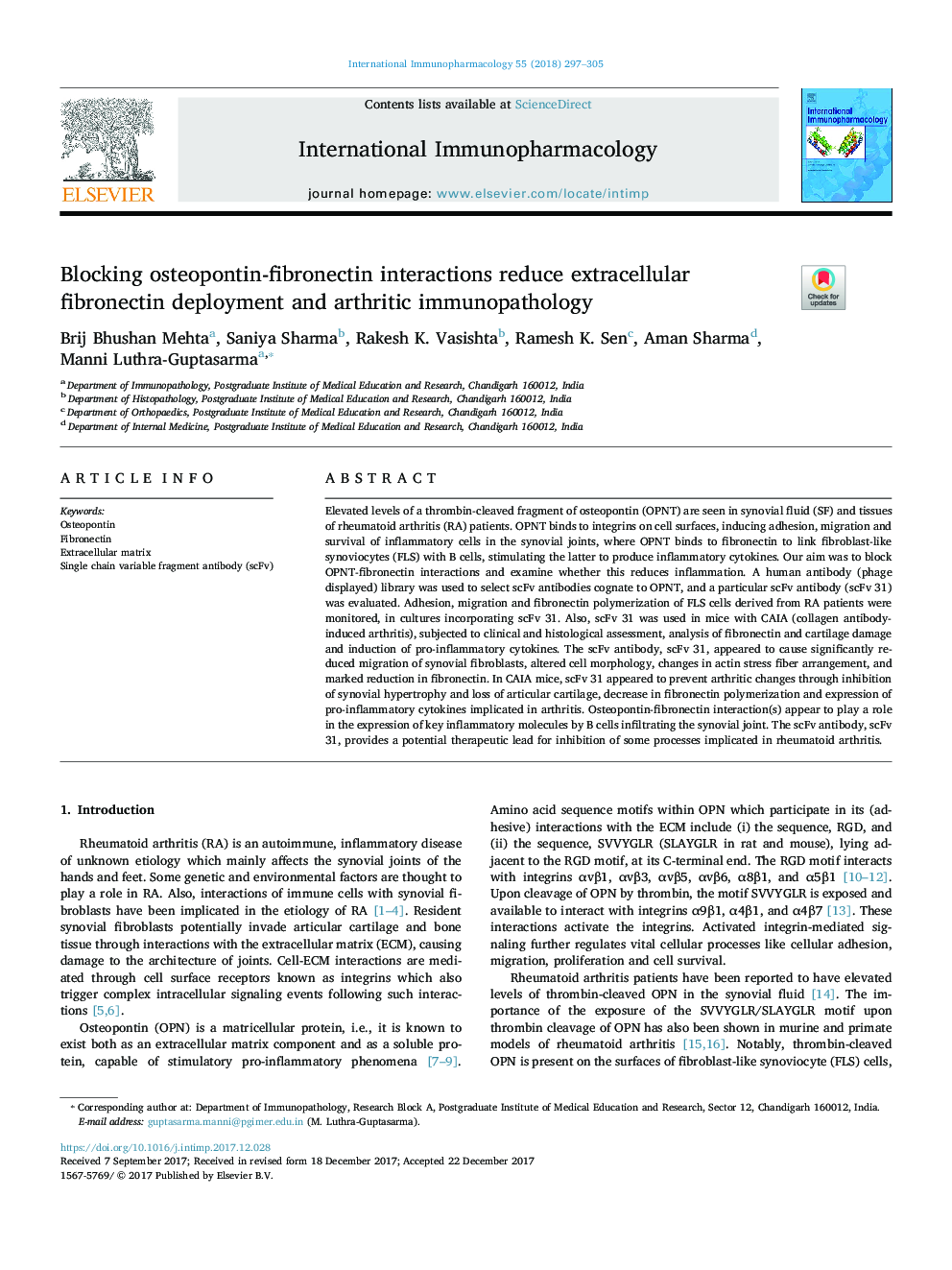| کد مقاله | کد نشریه | سال انتشار | مقاله انگلیسی | نسخه تمام متن |
|---|---|---|---|---|
| 8531492 | 1559735 | 2018 | 9 صفحه PDF | دانلود رایگان |
عنوان انگلیسی مقاله ISI
Blocking osteopontin-fibronectin interactions reduce extracellular fibronectin deployment and arthritic immunopathology
دانلود مقاله + سفارش ترجمه
دانلود مقاله ISI انگلیسی
رایگان برای ایرانیان
کلمات کلیدی
موضوعات مرتبط
علوم زیستی و بیوفناوری
ایمنی شناسی و میکروب شناسی
ایمونولوژی
پیش نمایش صفحه اول مقاله

چکیده انگلیسی
Elevated levels of a thrombin-cleaved fragment of osteopontin (OPNT) are seen in synovial fluid (SF) and tissues of rheumatoid arthritis (RA) patients. OPNT binds to integrins on cell surfaces, inducing adhesion, migration and survival of inflammatory cells in the synovial joints, where OPNT binds to fibronectin to link fibroblast-like synoviocytes (FLS) with B cells, stimulating the latter to produce inflammatory cytokines. Our aim was to block OPNT-fibronectin interactions and examine whether this reduces inflammation. A human antibody (phage displayed) library was used to select scFv antibodies cognate to OPNT, and a particular scFv antibody (scFv 31) was evaluated. Adhesion, migration and fibronectin polymerization of FLS cells derived from RA patients were monitored, in cultures incorporating scFv 31. Also, scFv 31 was used in mice with CAIA (collagen antibody-induced arthritis), subjected to clinical and histological assessment, analysis of fibronectin and cartilage damage and induction of pro-inflammatory cytokines. The scFv antibody, scFv 31, appeared to cause significantly reduced migration of synovial fibroblasts, altered cell morphology, changes in actin stress fiber arrangement, and marked reduction in fibronectin. In CAIA mice, scFv 31 appeared to prevent arthritic changes through inhibition of synovial hypertrophy and loss of articular cartilage, decrease in fibronectin polymerization and expression of pro-inflammatory cytokines implicated in arthritis. Osteopontin-fibronectin interaction(s) appear to play a role in the expression of key inflammatory molecules by B cells infiltrating the synovial joint. The scFv antibody, scFv 31, provides a potential therapeutic lead for inhibition of some processes implicated in rheumatoid arthritis.
ناشر
Database: Elsevier - ScienceDirect (ساینس دایرکت)
Journal: International Immunopharmacology - Volume 55, February 2018, Pages 297-305
Journal: International Immunopharmacology - Volume 55, February 2018, Pages 297-305
نویسندگان
Brij Bhushan Mehta, Saniya Sharma, Rakesh K. Vasishta, Ramesh K. Sen, Aman Sharma, Manni Luthra-Guptasarma,